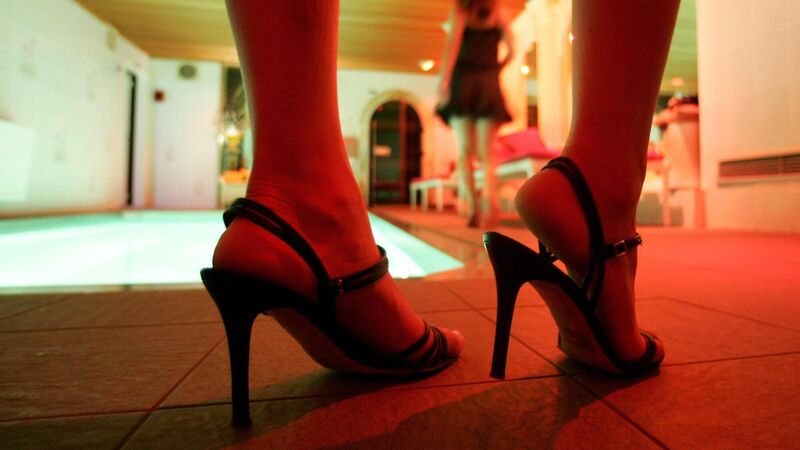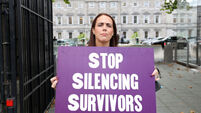Sex worker in Ireland: New law has made my business more dangerous

There are very serious risks of violence and abuse in sex work and we have no real avenues for protection or support, other than other sex workers. But that too is impacted by the law. File photo: Andreas Rentz/Getty Images
I’ve been a sex worker in Ireland since 2015.
In 2017, a law was introduced with the publicly stated intention of protecting people like me but instead, it’s actually making us less safe, and in fact has increased the risks of violence, abuse and isolation.
Sex workers said that this would happen but they were not listened to when the law was being created. Instead, others were allowed to speak for us. That’s why I am speaking out now.
The law is being reviewed this year, so it’s time the Irish government finally listened to us. The 2017 Criminal Law (Sexual Offences) Act made the purchasing of sex a criminal offence. It also increased the penalties for ‘living on earnings of prostitution' and ‘brothel keeping’.
I can see why someone might think these would not increase the risks for us, but I would encourage people to think about what those laws mean in actuality.
‘Brothel keeping’ means if I work in an apartment with another sex worker I am transformed on paper and in law into a nefarious brothel keeper. The reality is that the vast majority of sex workers who work together do so for safety.
Read More
And this is not just my experience, Amnesty International’s new research on Ireland shows how these laws make sex workers afraid to work together, making us even more isolated.
And there is a whole other element.
Being white and Irish allows me some protection; since the laws were introduced, those targeted have disproportionately been migrants.
Criminalising the buying of sex also means we have even fewer ways to protect ourselves. We can’t screen our clients and we have to take more risks with our safety. And the Guards are no friends to sex workers.
Could you imagine reporting a crime to the same authority that could raid your home for ‘brothel keeping’? That could report you to your landlord and get you evicted?
This is backed up by Amnesty’s research that also shows that there is “a profound lack of trust” in the gardaí, especially for migrants.
Along with increased violence, one of the most hard-hitting results of these laws is that they prevent us from having normal, human relationships.
In an ideal world, I want to be able to tell people what I do for a living and not fear eviction, and not fear the loss of opportunities outside of sex work should I choose to pursue them.
Please take a moment to imagine what it would be like if merely answering “what do you work as?” truthfully could mean that the person who asked never speaks to you again at best.
Or at worst calls social services and petitions to have your children taken away, or alerts your landlord to have you evicted. Imagine that the laws empower them and say that it is justice for them to do so.
My experience under the so-called ‘Nordic Model’ has been one of isolation and hypervigilance.
When I began working, I was staying with a friend as I could not find a place to live because of the housing crisis. I had applied to jobs with no response and without a permanent address, sex work appealed more and more.
I first entered the industry specifically because of the housing crisis, as it was the only viable way to work while having to constantly move from one temporary home to another. However, because of the laws, I have the constant fear that my landlord will find out and evict me, as the law empowers him to do.
And while the risk of losing my home is huge, I’ve been relatively lucky with my experiences. There are very serious risks of violence and abuse in sex work and we have no real avenues for protection or support, other than other sex workers. But that too is impacted by the law.
When I started out, because of the stigma and the laws being brought in in 2017, I didn’t think it would be safe to reach out to other sex workers. Even just being able to talk to a fellow worker in a non-judgemental way would have been a godsend to me.
I only became a part of a community when I started working in a strip club years after I began escorting. The irony being that the legality of strip clubs means that those workers can have a safe environment and be each other’s support network.
Because of the criminal law in Ireland, the same cannot be said for those of us who are escorts and must by law work alone.
The other significant issue is that people mix up sex work with trafficking, but they are not the same thing. Trafficking is a horrific crime and Ireland is failing people who are being trafficked and exploited. But treating it as the same thing doesn’t protect any of us.
Ireland needs to decriminalise sex work for the safety of workers, and so that those who wish to exit can have strategies available to them without the fear of criminal records and stigma hanging over their heads.
We need to be consulted when the Irish government are reviewing the law this year, and in a real, meaningful way. We need to fund initiatives such as Red Umbrella Front that are community-led, which means it can operate as both a safe space of support and refuge for those currently working.
We need laws that mean workers who wish to can safely work together, and so that the most vulnerable in our community are not further disenfranchised by fines, arrest, or deportation.















